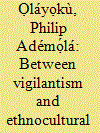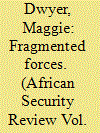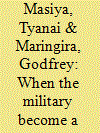| Srl | Item |
| 1 |
ID:
156545


|
|
|
|
|
| Summary/Abstract |
Postmodern contradictions in postcolonial Nigeria have led to the fetishisation of alternative local security measures often labelled as vigilante activities. The profiling of these groups as ethnic militia often undermines their essential bid to provide security while delimiting security needs to the physical. The fallouts of such profiling are frictions between federal security agents and ethnic-based security groups, often resulting in violence, as exemplified by the 7 May 2013 incident between the Nigerian federal security agents and the Ombatse. This study focuses on the emergence and activities of the Ombatse as an alternative security apparatus of the Eggon. It presents three years of field research which entailed the use of ethnography, key informant interviews and observation. The findings reveal that the Ombatse emerged to assert historical legitimacy for both the physical and spiritual securitisation of the Eggon through a return to the ancestral ways of social engineering. The study considers the security challenges in Nigeria, and also situates the Eggon historical context within political, religious, sociocultural and economic intersections of securitisation. It concludes that the Ombatse situates its legitimacy within the Eggon past and retains its relevance through the holistic focus of providing both physical and spiritual security.
|
|
|
|
|
|
|
|
|
|
|
|
|
|
|
|
| 2 |
ID:
156547


|
|
|
|
|
| Summary/Abstract |
An analysis of the security vetting files of 19 employees within a South African national department who had been found guilty of financial misconduct in the last five years uncovered that the existing security vetting processes did not detect the financial misconduct of which these employees have been found guilty. This research sets out to establish whether security vetting can be extended to include the detection of financial misconduct within the department and, if so, how. Moreover, if security vetting can indeed be so extended, can it possibly enhance the management of fraud risk across all South African public sector departments? Qualitative interviews were conducted with 27 employees who are key to fraud risk management and security vetting within the researched department. During the interviews, the following five themes emerged: (1) the reasons why employees commit financial misconduct; (2) why it is not detected by the security vetting process; (3) the potential alignment of the security vetting process to facilitate the detection of financial misconduct; (4) the following through on security vetting findings; and (5) sharing these findings with the internal audit and risk management functions within state departments. These themes were probed and are reported on, establishing firstly that security vetting can indeed be extended to include the detection of financial misconduct within the researched department, and secondly that it can enhance the management of fraud risk across all South African public sector departments, given the specific mandate of the State Security Agency (SSA) and the national security vetting strategy.
|
|
|
|
|
|
|
|
|
|
|
|
|
|
|
|
| 3 |
ID:
156544


|
|
|
|
|
| Summary/Abstract |
This article provides a detailed look at the history of the Gambia Armed Forces (GAF), a military that has received very little academic attention within the study of African state security forces. It identifies key turning points in the GAF’s history, and highlights the vastly different roles the military played in the state under President Jawara (1965–94) and President Jammeh (1994–2017). Yet, it also highlights important similarities regarding internal patterns within the armed forces and shows the ways in which these continuities may challenge attempts to restructure the security sector. The article draws on archival research and interviews conducted with retired and active duty Gambian military personnel, government officials, and Gambian scholars.
|
|
|
|
|
|
|
|
|
|
|
|
|
|
|
|
| 4 |
ID:
156543


|
|
|
|
|
| Summary/Abstract |
This essay recalls the immediate and longer-term responses of the US and its allies to the events of 9/11. It contends that the die for contemporary developments in transnational terrorism was cast in the immediate aftermath of 9/11 – in particular the launching of sustained ‘anti-terrorist’ military combat operations in Afghanistan and Iraq, and more covert ‘kinetic’ operations elsewhere in the Middle East and Africa. The essay seeks specifically to expose the counter-productivity of using military operations as the primary antidote to transnational terrorism. Focusing on the African ‘laboratory’ and the spread of transnational terrorism and Islamic militancy, particularly in West and East Africa, the essay concludes that radical Islamists have mastered the ‘battle of the narrative’ and that the Western penchant for dispensing a kinetic brand of medication is feeding rather than fighting the virus of global terrorism.
|
|
|
|
|
|
|
|
|
|
|
|
|
|
|
|
| 5 |
ID:
156546


|
|
|
|
|
| Summary/Abstract |
The military poses an ongoing threat to modern democratic rule in some African countries, especially in the Zimbabwean context. This paper reveals the ways in which Zimbabwe National Army (ZNA) generals have played a political role in the Zimbabwean elections, an issue which is both a political threat and a security threat to the state. It is argued that the ways in which ZNA generals engage in the political process goes against Section 208(2) of the constitution of Zimbabwe, which summarily states that the military must be apolitical. In substantiating this argument, the paper presents and analyses various public speeches made by army generals. It is contended that the army generals’ support of the Zimbabwe African National Union – Patriotic Front (ZANU-PF) and President Robert Mugabe has to be understood as a ‘mutual accommodation’, i.e. the generals are offered privileges in return for the political protection of the ruling regime which negatively impacts the security of the vote.
|
|
|
|
|
|
|
|
|
|
|
|
|
|
|
|